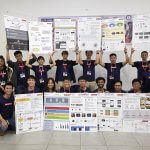By the SMU Postgraduate Research Programmes Team
When Ding Ying, an SMU PhD in Information Systems graduate, started his job market search, he had no idea that he would secure a placement with Vipshop (US) Inc., one of the top companies located at Silicon Valley. He shared with us how he has applied cutting-edge machine learning techniques to his work at Vipshop. Here is his story.
Can you tell us more about your current job placement at Vipshop?
Ding Ying: I’m a Senior Machine Learning Scientist at Vipshop (US) Inc., which is the research and development department located in the Bay Area, and is part of vip.com—the fourth largest e-commerce company in China. My work focuses on using machine learning techniques to improve user experience and engagement, and the efficiency of our website and mobile application.
How did you secure your current placement?
Ding Ying: This is an interesting story. I started searching for my job placement in January 2017, and I had targeted companies in Singapore. In February 2017, I had a paper published in AAAI-2017, and I went to San Francisco for a conference. At the conference, I met a friend’s friend and learnt that he had just joined the company then. He informed me that the company was hiring and encouraged me to apply for the position.
To be honest, I wasn’t very confident as I had heard that the hiring bar of companies in Silicon Valley was usually pretty high. I told myself that it was a great opportunity and I should try. The worst that could happen would be that I won’t get the offer, and I was alright with that.
Fortunately, I was offered a position and accepted it. In my opinion, the interview was not as difficult as I thought. PhD students from the SMU School of Information Systems are very talented and hardworking, and I strongly believe that they are all able to secure jobs at places like Silicon Valley.
The most valuable things that I have learnt from the job search experience are as follows:
- build connections,
- talk to people,
- keep trying, and
- believe in yourself!
Could you share some examples of your research projects that you are currently working on?
Ding Ying: I have been working on several projects since I joined the company. My work encompasses both research and development. To be more specific, I apply cutting-edge machine-learning techniques to our business.
One of my projects is to identify users whom we should distribute coupons to, based on their historical behaviour data. Coupon distribution is one of the most important approaches to improve user engagement. However, there are challenges. Ideally, we want to find out which users will come back and make purchases after receiving coupons. Identifying these users can be very difficult without the help of machine-learning techniques. My colleagues and I developed several models based on Gradient Boosting Decision Tree (GBDT), Random Forest, and Deep Neural Networks (DNN) to resolve this problem. Centred around these machine-learning models, we also built a data-processing system that can process tens of millions of users to serve our daily operations.
Another project I have been working on is the re-ranking of products in the visual search module of our application. This module was named “PaiLiGou” (which in Chinese means to make a purchase right after taking the photo). A user can click on the small camera button in our application and search for products based on a photo he takes. When it was first launched, it was purely based on visual similarity empowered by deep-learning models. After some thorough analysis of historical data, we found that re-ranking of the products based on the products’ metadata and the user features (which were extracted from user demographics and online behaviours such as what they browsed, purchased and clicked) can make this module more intelligent and personalised. So we developed a GBDT-based re-ranking model to improve search results and added it as a micro-service to the system. Users’ searching experience was significantly improved after that change.
How has your experience been like so far as a machine learning scientist?
Ding Ying: I really enjoy my work, and feel glad to be able to develop such business solutions!








